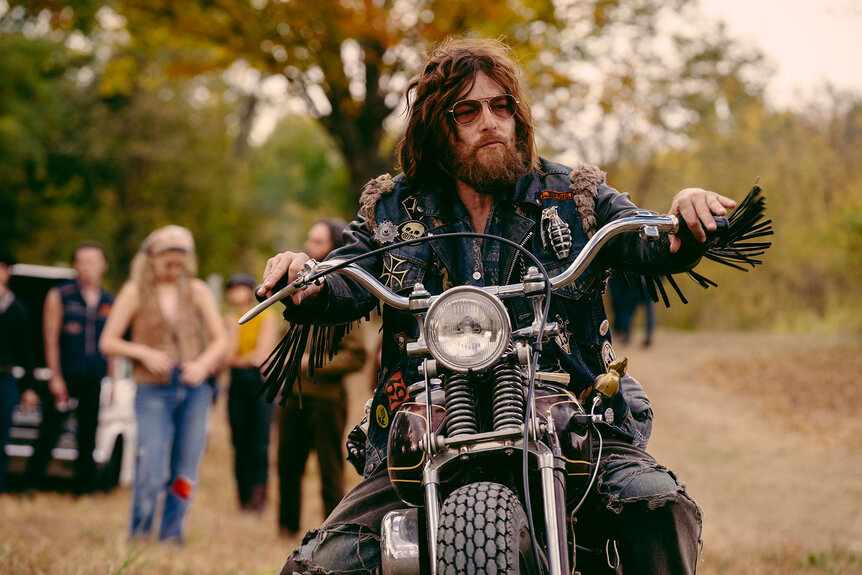The Bikeriders (3 stars out of 4)
2024 is shaping up to be a good year for movies about photography. “Civil War” already showed us a potential American conflict through the eyes of a photojournalist, and now “The Bikeriders” brings, of all things, a coffee table book to the big screen.
Jeff Nichols’ film is based on the real-life efforts of Danny Lyon, a photojournalist who embedded with the Vandals motorcycle club in Chicago in the late 1960s. Lyon’s photos and interviews eventually became a book—also called, “The Bikeriders.”
The story follows three main characters, Johnny (Tom Hardy) the founder of the Vandals, Benny (Austin Butler), his would-be successor, and Kathy (Jodie Comer), Benny’s wife, who also serves as the film’s narrator through Lyon’s interviews. In a narrative that mostly moves chronologically and often feels like a documentary, “The Bikeriders” traces the origins and rise of the Vandals in the late 1960s, while showing the growing influence of drugs and violence within biker culture.
Elements of the film will be familiar to anyone with a passing understanding of the Hell’s Angels, the iconography of the Harley Davidson, or even the tragedy of Altamont in 1969 (when the Rolling Stones hired the Angels to provide security, only to watch them murder a fan only a few feet from the stage). But what’s interesting about “The Bikeriders” is how it attempts to show how the Vandals began as a simple group of like-minded blue-collar Midwesterners who used to get together and race their bikes.
It isn’t long, however, before fierce territoriality sets in, and the movie draws continual tension from the constant friction between members of the club and most anyone they encounter, whether members of rival clubs or even upstarts looking to join the Vandals. One such upstart, played by Toby Wallace, provides a narrative thread that lingers beneath the surface of the film, nodding to the dark future of the club and its culture. Listed only as The Kid, Wallace’s character is a young foil to Hardy and even Butler, whose Brando-like detachment still feels older and wiser by comparison.
As good as the performances are from Hardy and Butler, though, Comer is the real highlight, guiding the narrative with a comic Midwestern drawl and a wide-eyed disbelief at the manic world she married into. Not only does Kathy provide the narration, but the audience also sees the movie through her outsider eyes.
Of course, the film puts a lot of emphasis on its cinematography, and manages to feature its many classic bikes without feeling too much like a Harley commercial. Tack on a period soundtrack and its dark sense of humor, and “The Bikeriders” becomes an immersive experience that feels like it does justice to its source material.
At the same time, like “Goodfellas” back in 1990, “The Bikeriders” stops short of showering its subject with too much sunshine. Nichols’ film takes pains to be honest, and between its spurts of violence and moral ambiguity, “The Bikeriders” manages to humanize its characters while stopping short of making them heroes. Even anti-hero feels like a stretch with a character like Johnny, who seems perfectly content to make innocent people pay in his quest to seek revenge on behalf of a fellow Vandal.
That may be one of the prime takeaways from “The Bikeriders:” it’s a good film about an unsettling subject. Even if many of today’s riders may be fueled by nostalgia and traditional 9-5 incomes, Nichols’ film showcases the ugly side of biker culture, before and after the drugs and the violence kicked in.
“The Bikeriders” is rated R for consistent profanity, scattered brutality and violence, and some frightening moments.

